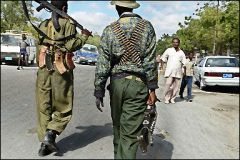Somali warlords, lawmakers reject troops from neighboring countries
By RODRIQUE NGOWI, Associated Press Writer
NAIROBI, Kenya, Feb 27, 2005 (AP) — Warlords and lawmakers from a clan that controls the Somali capital on Sunday rejected plans to include troops from neighboring countries in a regional force to secure the country’s transitional government as it returns from exile in Kenya.
 Some 61 lawmakers, including warlords-turned-Cabinet ministers, said that including troops from neighboring Ethiopia, Djibouti and Kenya in the force to secure Somalia would undermine fragile efforts to end a 14-year civil war in the Horn of Africa nation.
Some 61 lawmakers, including warlords-turned-Cabinet ministers, said that including troops from neighboring Ethiopia, Djibouti and Kenya in the force to secure Somalia would undermine fragile efforts to end a 14-year civil war in the Horn of Africa nation.
Ethiopia actively supported Somali factions with money and weapons in the war, and its troops could seek to advance Ethiopian interests if deployed in the country, Deputy Prime Minister Hussein Mohamed Aidid.
The lawmakers filed a motion Sunday for Somalia’s transitional parliament to back a multinational force — minus troops from the neighboring countries — to help restore peace in the anarchic country. The legislature is to consider the motion Monday, Aidid said.
Among the warlords who backed the motion were Minster for National Security Mohamed Qanyare Afrah, Minister for Trade Musa Sudi Yalahow, Minister for Demobilization Botan Isse and Minister for Religious Affairs Omar Mohamud.
The four, as well as Aidid, are members of the Hawiye clan, one of Somalia’s four main clans and the one which controls Mogadishu.
The transitional government has been based in Kenya because Mogadishu is considered unsafe. President Abdullahi Yusuf Ahmed and Prime Minister Ali Mohamed Gedi are negotiating a safe return to the capital.
“We would accept troops from the international community to come in a peace-support mission — not a peacekeeping mission — but we are against any involvement of neighboring countries,” Aidid said. “We do not mind troops from Uganda, South Africa, Nigeria and other countries, including members of the Arab League.”
Gedi’s Cabinet asked the African Union and Arab League earlier this month to send between 5,000 and 7,500 troops with a one-year mandate to protect the government as it organizes a police force and army.
The AU Peace and Security Council authorized deployment of an interim force ahead of a fuller AU mission.
Residents of Mogadishu and other southern towns, however, have held several demonstrations against having troops from Ethiopia, Djibouti and Kenya included in a force. Some protesters rejected troops from any foreign country.
Kenya and Djibouti later said they would not send troops, but Ethiopia insists it will send its forces.
Somalia has been without an effective central government since clan-based warlords ousted dictator Mohamed Siad Barre in 1991. They then turned on each other, sinking the Horn of Africa nation of 7 million into anarchy.
Yusuf and Gedi are on their first visit to Somalia since taking office to assess conditions for relocating Somalia’s government and parliament, which was formed last year after intricate and difficult negotiations in Kenya.
